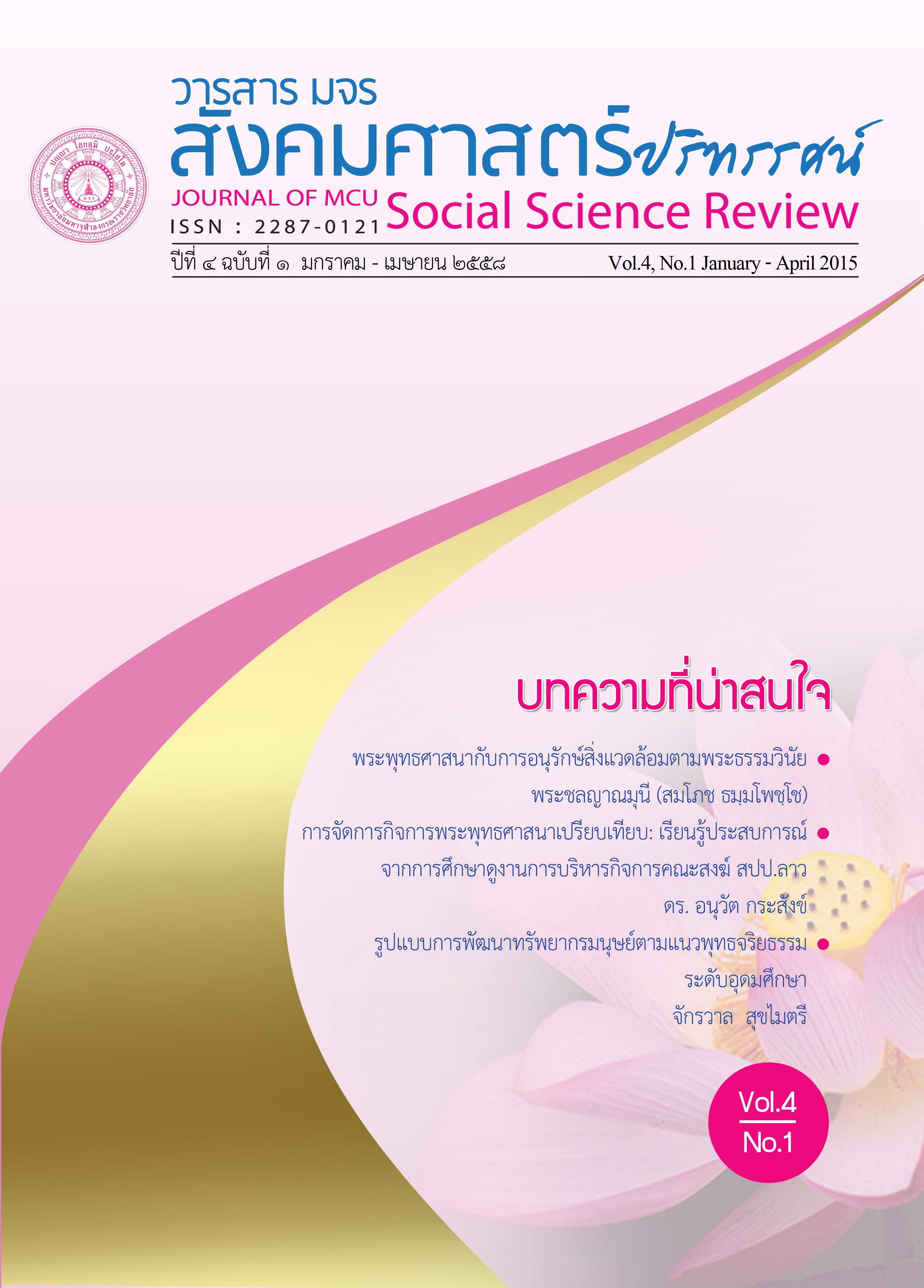การฝึกวิชาชีพและค่าตอบแทนการทํางานของผู้ต้องขัง
คำสำคัญ:
การฝึกวิชาชีพ, ค่าตอบแทน, ผู้ต้องขังบทคัดย่อ
การศึกษาเรื่องการฝึกวิชาชีพและค่าตอบแทนการทํางานของผู้ต้องขัง มีวัตถุประสงค์ เพื่อ (๑) ศึกษาแนวคิด ทฤษฎี และวิวัฒนาการการฝึกวิชาชีพและค่าตอบแทนการทํางานของผู้ต้องขัง (๒) ศึกษาสภาพปัญหาและประเด็นทางกฎหมายที่เกี่ยวข้องกับการฝึกวิชาชีพและค่าตอบแทนการ ทํางานของผู้ต้องขังของประเทศไทย ประเทศสหรัฐอเมริกา และประเทศญี่ปุ่น (๓) วิเคราะห์ กฎหมายที่เกี่ยวข้องกับการฝึกวิชาชีพ และค่าตอบแทนการทํางานของผู้ต้องขังของประเทศไทย เปรียบเทียบกับกฎหมายประเทศสหรัฐอเมริกา และประเทศญี่ปุ่น (๔) นําผลการวิเคราะห์มา สังเคราะห์เป็นแนวทางในการแก้ไขปรับปรุงกฎหมายที่เกี่ยวข้องกับการฝึกวิชาชีพและค่าตอบแทน การทํางานของผู้ต้องขัง การศึกษาเรื่องนี้ เป็นการวิจัยทางนิติศาสตร์ โดยการวิจัยเชิงคุณภาพ ด้วยวิธีการวิจัย เอกสาร จากหนังสือ ตํารา บทความ ซึ่งค้นคว้าและวิเคราะห์ข้อมูลจากกฎหมายที่เกี่ยวข้องกับ ผู้ต้องขังด้านการฝึกวิชาชีพและค่าตอบแทนการทํางานของผู้ต้องขังของประเทศสหรัฐอเมริกา ประเทศญี่ปุ่น โดยนํามาเปรียบเทียบกับประเทศไทย เพื่อเป็นแนวทางในการแก้ไขเพิ่มเติมและ ปรับปรุงกฎหมายต่อไป
จากการศึกษาพบว่า การฝึกวิชาชีพของผู้ต้องขัง ทุกประเทศต่างให้ความสําคัญเนื่องจาก เป็นการพัฒนาจิตใจและฝึกให้ผู้ต้องขังมีระเบียบวินัยรักการทํางาน ประเทศสหรัฐอเมริการัฐบาลจะ เป็นผู้ประสานงานเพื่อจัดสรรงานให้กับเรือนจํา โดยหน่วยงานที่มีชื่อว่าอุตสาหกรรมสหพันธ์ ผู้ต้องขัง ส่วนในประเทศญี่ปุ่นมีหน่วยงานที่มีชื่อว่า สหพันธ์ราชทัณฑ์ญี่ปุ่นทําหน้าที่ให้การ สนับสนุน และส่งเสริมผลิตภัณฑ์ที่เกิดจากฝีมือผู้ต้องขัง สําหรับประเทศไทยไม่มีหน่วยงานเฉพาะ ในด้านนี้ ทําให้ผลิตภัณฑ์ที่ผลิตต้องจําหน่ายที่เรือนจําหรือในงานต่าง ๆ ส่วนค่าตอบแทนการทํางานของ ผู้ต้องขัง ทุกประเทศจัดให้มีเหมือนกันแต่แตกต่างกันกล่าวคือ ประเทศสหรัฐอเมริกา ผู้ต้องขังจะได้รับ ค่าจ้างเหมือนแรงงานภายนอกและต้องเสียภาษีเต็มจํานวน ส่วนในประเทศญี่ปุ่นผู้ต้องขังจะ ได้รับค่าตอบแทนจากการทํางานที่มีจํานวนน้อยและเสียภาษีไม่มากเนื่องจากค่าแรงต่ํา สําหรับ ประเทศไทยผู้ต้องขังจะได้รับค่าตอบแทนการทํางานไม่เกินร้อยละห้าสิบจากกําไรและไม่ต้องเสีย ภาษี ซึ่งผู้ศึกษาเห็นว่า การฝึกวิชาชีพของผู้ต้องขัง ควรแก้ไขปรับปรุงดังนี้ (๑) นํามาตรการเลี้ยงโทษจําคุกมาใช้ให้มากขึ้น เพื่อเก็บพื้นที่เรือนจําไว้ควบคุมผู้ต้องขังที่อัตราโทษสูงเท่านั้น (๒) กรมราชทัณฑ์ ควรเป็นผู้จัดหาผู้ว่าจ้างแรงงานผู้ต้องขังเองเพื่อให้ได้ผู้ว่าจ้างรายใหญ่ที่จ่ายค่าตอบแทนที่มากกว่า (๓) การจําหน่ายผลิตภัณฑ์ควรมีหน่วยงานพิเศษในการกระจายผลผลิตให้ทั่วถึงเพื่อให้เกิดความ คล่องตัวในการทํางาน (๔) ควรมีการตรวจสอบการใช้อํานาจของ เจ้าพนักงาน เพื่อให้มีความ โปร่งใสและป้องกันการละเมิดสิทธิผู้ต้องขัง (๕) ควรแก้ไขกฎหมายให้ผู้ต้องขังสามารถเลือกงานที่ ต้องทําได้ เพราะผู้ต้องขังแต่ละคนมีความรู้ความสามารถที่ต่างกัน สําหรับค่าตอบแทนการทํางาน ของผู้ต้องขังควรแก้ไขปรับปรุงดังนี้ (๑) กําหนดค่าตอบแทนขั้นต่ําไว้เพื่อความเป็นธรรมแก่ผู้ต้องขัง (๒) กําหนดความผิดทางวินัยซึ่งมีผลต่อการจ่ายค่าตอบแทนการทํางานของผู้ต้องขัง (๓) การยื่น คําร้องทุกข์ต้องไม่มีเจ้าหน้าที่ราชทัณฑ์เข้ามาเกี่ยวข้อง เพื่อเป็นการควบคุมตรวจสอบการปฏิบัติ หน้าที่ของเจ้าพนักงานเรือนจําให้เป็นไปตามกฎหมาย กฏข้อบังคับ วัตถุประสงค์ และเป็น หลักประกันในการคุ้มครองสิทธิของผู้ต้องขังที่เกี่ยวกับการฝึกวิชาชีพและค่าตอบแทนการทํางาน รวมทั้งสิทธิอื่นๆ ของผู้ต้องขัง
เอกสารอ้างอิง
(๑) หนังสือ
กรมราชทัณฑ์, คู่มือการปฏิบัติงานด้านการพัฒนาพฤตินิสัยผู้ต้องขัง, กรุงเทพมหานคร: โรงพิมพ์ราชทัณฑ์, ๒๕๔๘.
กรมราชทัณฑ์, งานราชทัณฑ์เปรียบเทียบ : มาตรการในการแก้ไขฟื้นฟูผู้ต้องขัง กรุงเทพมหานคร: โรงพิมพ์ราชทัณฑ์, ๒๕๕๑.
กรมราชทัณฑ์, สารานุกรมงานราชทัณฑ์นานาชาติ, กรุงเทพมหานคร: โรงพิมพ์ราชทัณฑ์. ๒๕๕๒.
กรมราชทัณฑ์, โครงการศึกษาเปรียบเทียบงานราชทัณฑ์ไทยกับกลุ่มประเทศอาเซียน. กรุงเทพมหานคร: โรงพิมพ์ราชทัณฑ์, ๒๕๕๔.
กิติพงศ์ หังสพฤกษ์, กฎหมายแรงงาน สัญญาจ้างแรงงาน และกฎหมายคุ้มครองแรงงาน. กรุงเทพมหานคร: สํานักวิญญูชน, ๒๕๕๖.
กรมราชทัณฑ์, งานราชทัณฑ์เปรียบเทียบ : มาตรการในการแก้ไขฟื้นฟูผู้ต้องขัง, กรุงเทพมหานคร โรงพิมพ์ราชทัณฑ์, ๒๕๕๑.
(๒) วิทยานิพนธ์
วัชราภรณ์ จิตรชุม, การหลีกเลี่ยงการลงโทษจําคุกโดยงานคุมประพฤติศึกษาเฉพาะอัตราโทษการรอการลงโทษตามประมวลกฎหมายอาญา. วิทยานิพนธ์นิติศาสตรมหาบัณฑิต มหาวิทยาลัยธุรกิจบัณฑิตย์, ๒๕๔๕.
๒. ภาษาอังกฤษ
(1) Book
Black J.S.& Porter WL. Management Meeting New Challenges. New Jersey : Prentice-Hal, 2000.
Robert A. Pitts and David Lei. Strategic Management Building and Sustaining Competitive Advantage. Ohio : Thomson South-Western, 2006.
ดาวน์โหลด
เผยแพร่แล้ว
รูปแบบการอ้างอิง
ฉบับ
ประเภทบทความ
สัญญาอนุญาต
ลิขสิทธิ์ (c) 2018 วารสาร มจร สังคมศาสตร์ปริทรรศน์

อนุญาตภายใต้เงื่อนไข Creative Commons Attribution-NonCommercial-NoDerivatives 4.0 International License.
เพื่อให้เป็นไปตามกฎหมายลิขสิทธิ์ ผู้นิพนธ์ทุกท่านต้องลงลายมือชื่อในแบบฟอร์มใบมอบลิขสิทธิ์บทความให้แก่วารสารฯ พร้อมกับบทความต้นฉบับที่ได้แก้ไขครั้งสุดท้าย นอกจากนี้ ผู้นิพนธ์ทุกท่านต้องยืนยันว่าบทความต้นฉบับที่ส่งมาตีพิมพ์นั้น ได้ส่งมาตีพิมพ์เฉพาะในวารสาร มจร สังคมศาสตร์ปริทรรศน์ เพียงแห่งเดียวเท่านั้น หากมีการใช้ภาพหรือตารางหรือเนื้อหาอื่นๆ ของผู้นิพนธ์อื่นที่ปรากฏในสิ่งตีพิมพ์อื่นมาแล้ว ผู้นิพนธ์ต้องขออนุญาตเจ้าของลิขสิทธิ์ก่อน พร้อมทั้งแสดงหนังสือที่ได้รับการยินยอมต่อบรรณาธิการ ก่อนที่บทความจะได้รับการตีพิมพ์ หากไม่เป็นไปตามข้อกำหนดเบื้องต้น ทางวารสารจะถอดบทความของท่านออกโดยไม่มีข้อยกเว้นใดๆ ทั้งสิ้น





